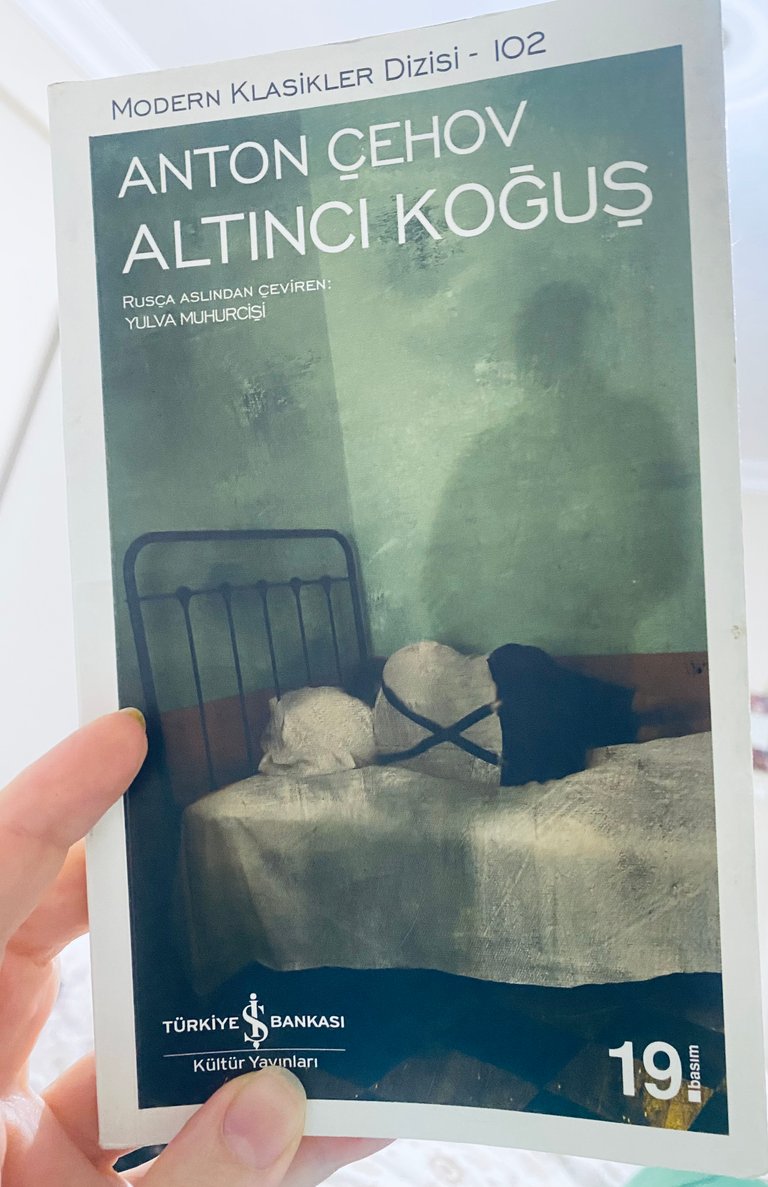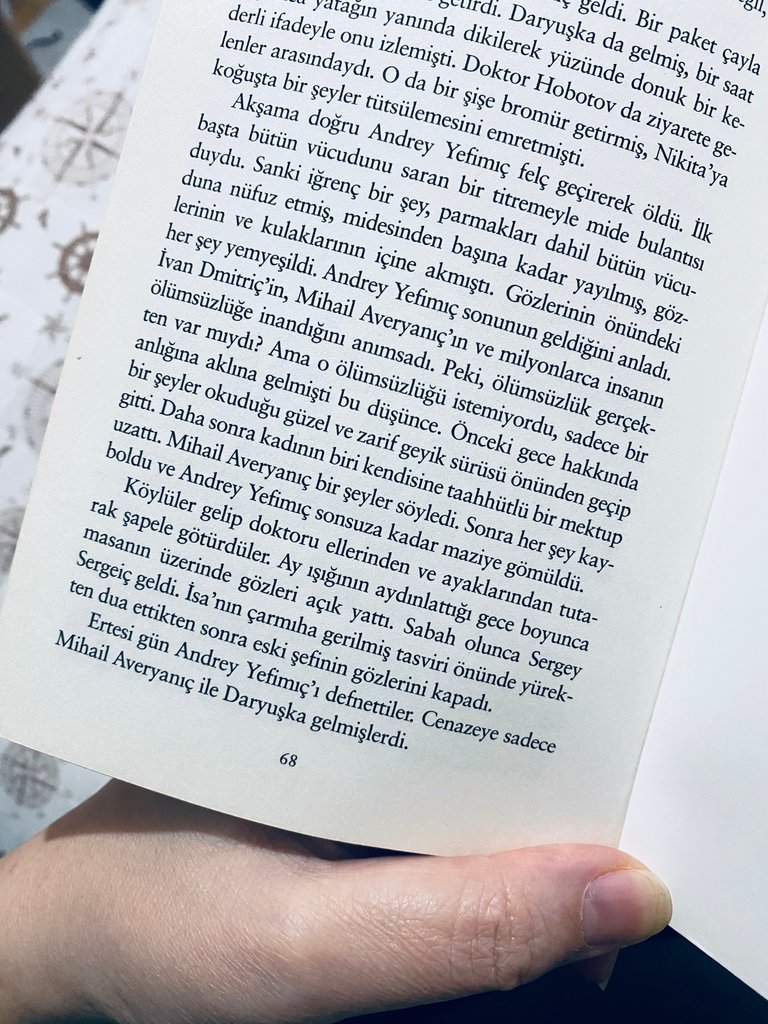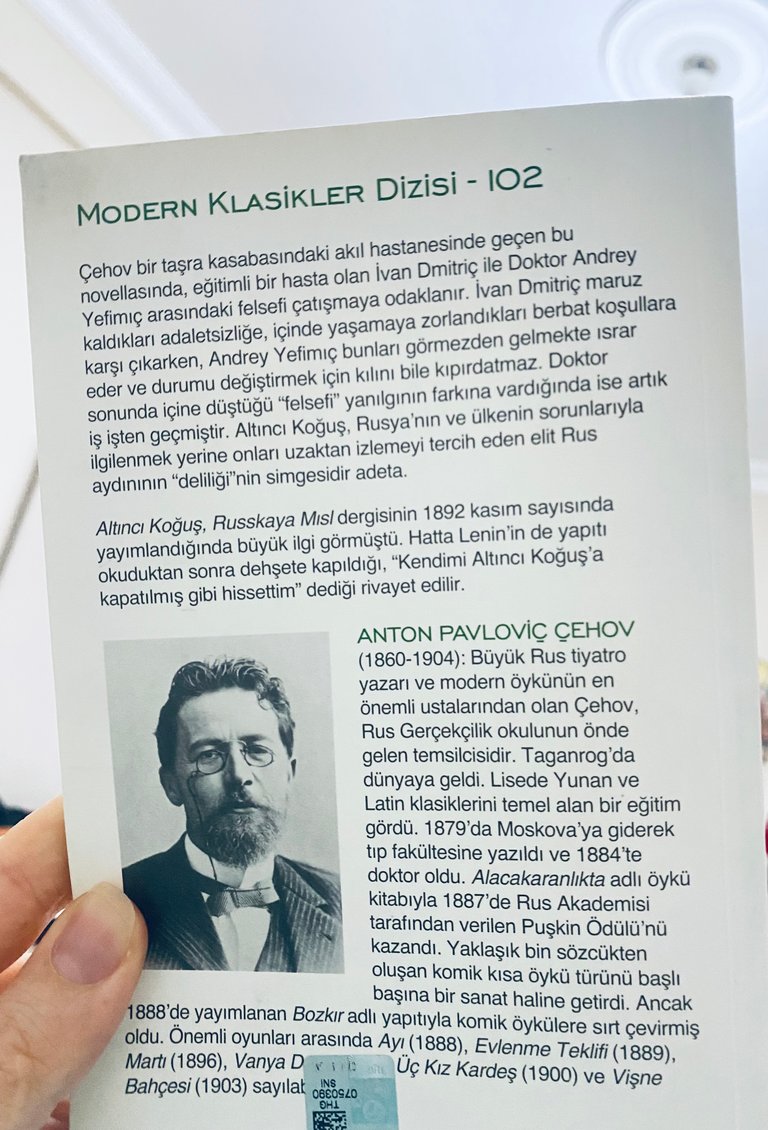Today my mother and I went to my aunt's house for breakfast. In our tradition, even if we are invited for breakfast, we usually have lunch and that's the end of the visit. After breakfast, the guests started talking about everyday life. The conversations revolved around household chores, husbands, wives, children and so on. Meanwhile, I saw Anton Chekhov's "The Sixth Ward" on my cousin's bookshelf and became curious and started reading it.
Bugün annemle birlikte teyzemlere kahvaltıya gittik. Bizim geleneklerde kahvaltıya davet edilsek bile, genellikle öğle yemeği de yenir ve misafirlik öyle biter. Kahvaltıdan sonra, misafirler arasında günlük yaşamdan konuşmalar başladı. Ev işleri, eşler, çocuklar ve benzeri konular etrafında dönen sohbetler, aslında her zamanki gibiydi. Bu sırada, kuzenimin kitaplığında Anton Çehov’un “Altıncı Koğuş” adlı kitabını gördüm ve merak edip okumaya başladım.

The book was 68 pages long and although I found it a little difficult to focus in the first pages, the story started to flow as it progressed. I finished the book in about three hours. Chekhov's novella is set in a mental hospital in a provincial town and deals with the philosophical conflict between Ivan Dmitrich, an educated patient, and Dr. Andrey Yefimiyich. Ivan objects to the injustice and appalling conditions they are subjected to, while the doctor prefers to turn a blind eye. The story symbolizes the insensitivity of Russia's elite to social problems.
Kitap 68 sayfaydı ve ilk sayfalarda odaklanmakta biraz zorlansam da, hikaye ilerledikçe akıcı gelmeye başladı. Yaklaşık üç saat içinde kitabı bitirdim. Çehov’un bu novellası, bir taşra kasabasındaki akıl hastanesinde geçen ve eğitimli bir hasta olan İvan Dmitriç ile Doktor Andrey Yefimiyç arasındaki felsefi çatışmayı ele alıyor. İvan, maruz kaldıkları adaletsizlik ve berbat koşullara karşı çıkarken, doktor ise bu durumu görmezden gelmeyi tercih ediyor. Hikaye, Rusya’nın elit kesiminin toplumsal sorunlara karşı duyarsızlığını sembolize ediyor.

"The Sixth Ward" deals not only with life in a mental hospital, but also with universal themes such as social injustice and individual responsibility. Ivan Dmitrich is an intelligent and philosophically minded character who lives with the other patients in the sixth ward of the hospital. His questioning and rebellion lead the reader to ask similar questions. Dr. Andrey Yefimiych initially appears as a figure who accepts the situation and makes no effort to change it. However, as the story progresses, we see that the doctor also experiences a change within himself.
“Altıncı Koğuş”, sadece bir akıl hastanesindeki yaşamı değil, aynı zamanda toplumsal adaletsizlik ve bireysel sorumluluk gibi evrensel temaları da ele alıyor. İvan Dmitriç, hastanenin altıncı koğuşunda diğer hastalarla birlikte yaşayan, zeki ve felsefi düşüncelere sahip bir karakterdir. Onun sorgulamaları ve isyanı, okuru da benzer soruları sormaya yönlendiriyor. Doktor Andrey Yefimiyç ise, başlangıçta durumu kabullenmiş ve değiştirmek için hiçbir çaba göstermeyen bir figür olarak karşımıza çıkıyor. Ancak hikaye ilerledikçe, doktorun da kendi içinde bir değişim yaşadığını görüyoruz.

In this work, Chekhov skillfully portrays the alienation and miscommunication of different segments of society. The conflict between Ivan's rebellion and the doctor's passivity is actually a reflection of a larger social structure. The story invites the reader to face similar situations in their own lives and take responsibility. Chekhov's characters make the reader question the choices and actions in their own lives.
Çehov, bu eserinde toplumun farklı kesimlerinin birbirine yabancılaşmasını ve iletişimsizliğini ustalıkla işliyor. İvan’ın isyanı ve doktorun pasifliği arasındaki çatışma, aslında daha geniş bir toplumsal yapının yansımasıdır. Hikaye, okuyucuyu kendi hayatında benzer durumlarla yüzleşmeye ve sorumluluk almaya davet ediyor. Çehov’un karakterleri, okuyucuya kendi hayatlarındaki seçimleri ve eylemleri sorgulatıyor.
"The Sixth Ward" attracted great attention when it was published in 1892 and it is said that even Lenin was horrified after reading it. Lenin is reported to have said, "I felt like I was locked up in the Sixth Ward". This shows how impressive and thought-provoking Chekhov's work is. The story has a universal value in terms of understanding not only the Russia of the period but also human nature and social structures.
“Altıncı Koğuş”, 1892 yılında yayımlandığında büyük ilgi görmüş ve hatta Lenin’in bile bu eseri okuduktan sonra dehşete kapıldığı söylenir. Lenin’in, “Kendimi Altıncı Koğuş’a kapatılmış gibi hissettim” dediği rivayet edilir. Bu durum, Çehov’un eserinin ne kadar etkileyici ve düşündürücü olduğunu gösteriyor. Hikaye, sadece dönemin Rusya’sını değil, insan doğasını ve toplumsal yapıları anlamak açısından da evrensel bir değere sahip.
My reading experience today reminded me once again how valuable it is to step out of the routine of daily life and dive into the depths of literature. Chekhov's "The Sixth Ward" is not just a story, but a profound interrogation of the human condition. Reading this book made me think more about my own life and the society I live in. Such experiences that literature offers us beyond everyday life are truly priceless.
Bugünkü okuma deneyimim, günlük yaşamın rutininden sıyrılıp edebiyatın derinliklerine dalmanın ne kadar değerli olduğunu bir kez daha hatırlattı. Çehov’un “Altıncı Koğuş”u, sadece bir hikaye değil, aynı zamanda insanlık durumuna dair derin bir sorgulama. Bu kitabı okumak, beni hem kendi hayatım hem de içinde yaşadığım toplum hakkında daha fazla düşünmeye itti. Edebiyatın, günlük yaşamın ötesinde bize sunduğu bu tür deneyimler, gerçekten paha biçilemez.
Reading books is always valuable.
Thank you so much🙏🏻
Yes, and that is why literature/stories matter. I wrote a post related to this last month, if you don't mind I'm attaching the link here: https://peakd.com/hive-180164/@coloringiship/why-stories-matter-or-the-transformative-power-of-literature
Im so happy to read this comment, I will read your post now🙏🏻 thank you so much.
I just checked the link, really liked your post.
Thank you ❤️